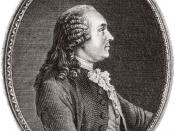Anne Robert Jacques Turgot was one of the greatest men of the 18th century and maybe of the century to follow. His attempts at reform during the latter half of the 18th century were unparalleled for their ingenuity during this period. However Turgot was a little too far ahead of his time and many of his concepts were received with skepticism and contempt by the ruling elites and monarchy of the time. It is easy to believe that had Turgot not been dismissed as controller-general of finances in 1776; France would have avoided revolution and survived prosperously into the 19th century. Turgot's reforms focused principally on the unjust taxation and treatment of the third estate during the Ancien Regime. The most controversial of these were "the six edicts" which sought to reform the old institutions of France from the ground up. Included in the edicts were reforms of the corvées, the burden on the peasants for transportation and maintenance; as well Turgot proposed limitation of the power of the guilds and tax farmers who were a major source of corruption during the period.
Turgot had even more grandiose plans for a state constitution, self-government, and public education; unfortunately much of this was left on the drawing board when Louis XVI dismissed him as controller-general in 1776. It will remain unknown whether any of these reforms, if passed, would have saved France; however that should not prevent the analysis and discussion of ideas which were decades ahead of their time.
Turgot believed society is a system of parts and each of these parts are connected to each other; each stage or part sets the conditions for the next stage or part of society (Manuel 1962). Comte got his ideas of society moving in an evolutionary pattern from Turgot; also...


